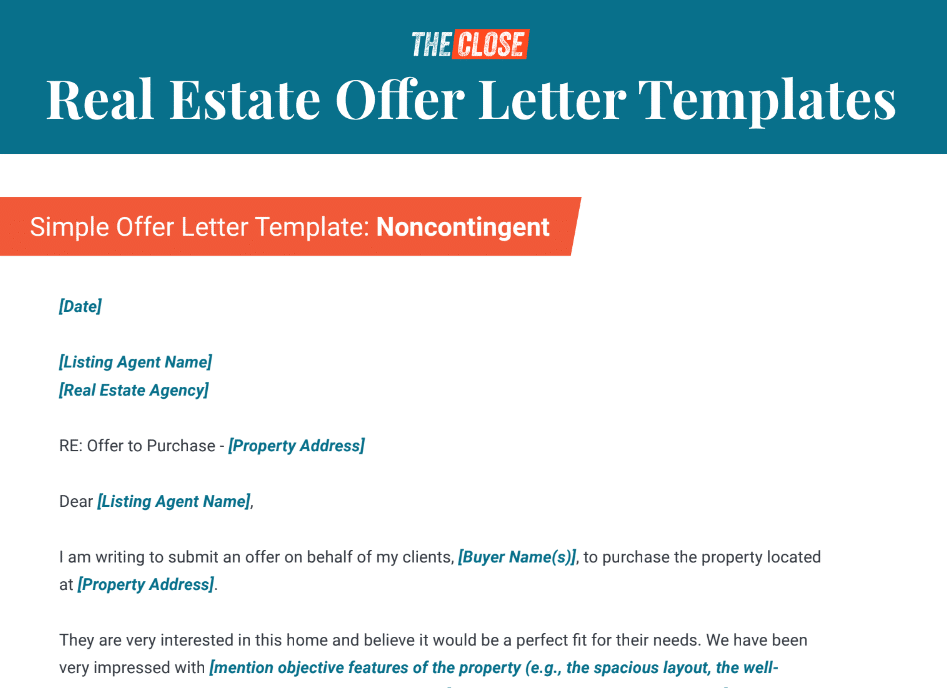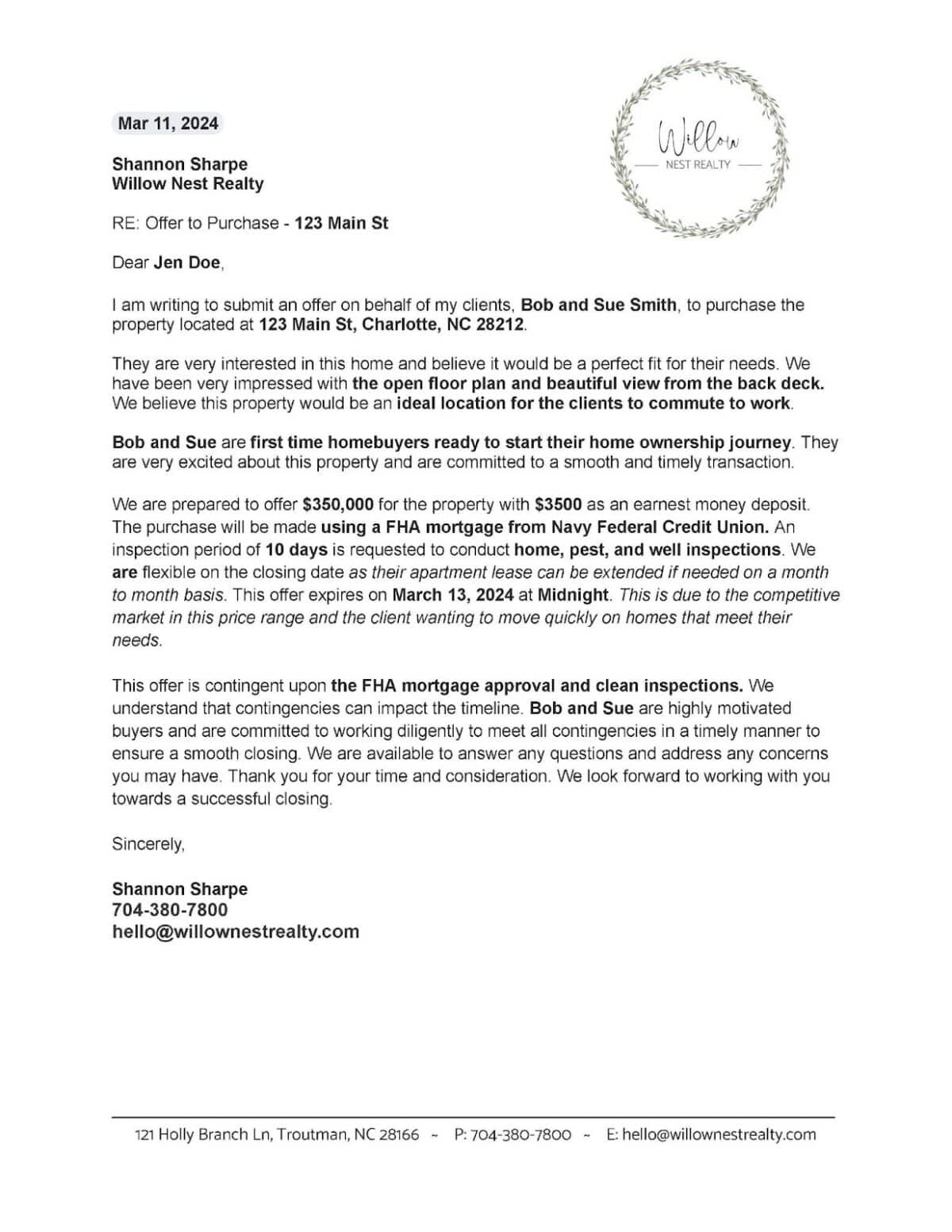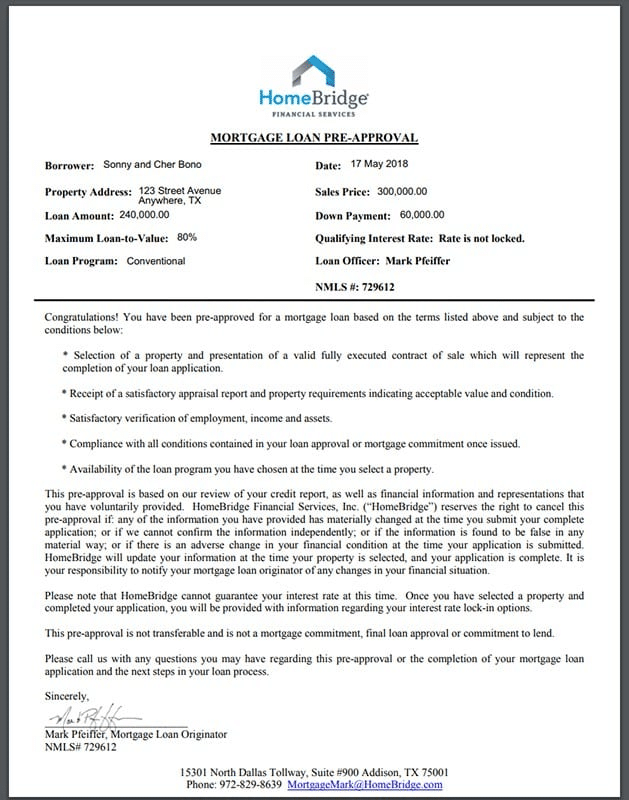Are you ready to become a master of the art of writing compelling home offer letters as a buyer’s real estate agent? It’s all about bringing the buyer’s offer to life, capturing the seller’s attention, and opening the door to negotiations. The goal is to find that perfect balance between sharing essential details about the offer and avoiding unnecessary personal information about the client.
Snag our free home offer letter templates, learn what to include and avoid in your letter, and get the inside scoop on how to deliver it to sellers.

What Is a Real Estate Home Offer Letter?
A real estate home offer letter, sometimes called a cover letter, is a written document submitted by a real estate agent on behalf of a potential buyer. This letter accompanies the formal purchase offer, expressing the buyer’s interest in purchasing a specific property, and helps the seller visualize the offer terms. The letter should highlight particular terms or conditions that the buyer believes will make their offer more appealing to the seller.
The goal of the real estate home offer letter is to connect with the seller to set the buyer’s offer apart from others. This strategy is particularly useful in competitive real estate markets where sellers receive multiple offers on their property.

Important Note: Don’t confuse a home offer letter with a buyer love letter. Offer letters, written by agents, focus on the technical details of the purchase. Love letters, written by buyers, express personal feelings about the property. See what the National Association of REALTORS® (NAR) says about Buyer Love Letters.
6 Items to Include in the Home Offer Letter
Imagine you are the seller for a moment. You have multiple offers in front of you. Which offers will you look at more carefully: the offers accompanied by a clear, detailed home offer letter or those without one? I’ll let you answer that question yourself.
When competition is high, real estate agents seek ways to get their clients’ offers noticed. Now is the time to showcase your ability to deliver the offer clearly and concisely. Real estate offer letter templates vary, but make sure to include the following elements:
- Introduce yourself professionally
- Provide details of the offer
- Explain the contingencies
- Flex the financials
- Close the deal
- Put a signature on it
1. Introduce Yourself Professionally
Open your letter with a professional greeting to the listing agent. Clearly state your role as the buyer’s agent, introducing the letter’s purpose as an offer submission. Keep it clear and to the point, directing the focus toward the property and the offer details. Ensure the cover letter is well-structured, free of grammatical errors, and written in a professional tone. Focus on the property and offer details to create a strong first impression.
[Date]
[Listing Agent Name]
[Real Estate Agency]
RE: Offer to Purchase – [Property Address]
Dear [Listing Agent Name],
I am writing to submit an offer on behalf of my clients, [Buyer Name(s)], to purchase the property located at [Property Address].
| Introduce the Parties | Personalize the letter for the seller by introducing your buyers by name. Briefly describe the type of buyer. Are they a first-time home buyer, a buyer purchasing a second home for vacations, or an investor? Highlight any pertinent information that could strengthen the offer, such as their commitment to the property. |
| Address and Property Description | This is as simple as providing the full property address. Optionally, add a short legal description of the property. It may include lot and block numbers, plat/map details, deed recording, or other unique identifying markers. |
2. Provide Details of the Offer
Provide a comprehensive breakdown of the offer. Be transparent about the buyer’s financing situation, ensuring the listing agent and seller will understand all the terms of the offer and what makes your buyer stand out from the competition. You can choose between two different styles when presenting the offer details. You can write it out as a paragraph or list the details in a bulleted list.
PARAGRAPH VERSION
We are prepared to offer [offer amount] for the property with [earnest money amount] as an earnest money deposit. [Optional: earnest money calculation explanation.] We are making this purchase [describe the financing situation objectively, e.g., preapproved for a mortgage, able to make a cash offer]. An inspection period of [# days] is requested to conduct [list of inspections]. We [are/are not] flexible on the closing date. [Optional: provide reasoning.] This offer expires on [Date] at [Time]. [Optional: provide reason for the deadline.]
BULLETED VERSION
Purchase Price: $[Offer Price]
Earnest Money Deposit: $[Earnest Money Deposit Amount]
Financing: [Financing Type (e.g., Conventional Mortgage, Cash)]
Inspection Period: [Number] days
Contingencies: Briefly explain any contingencies tied to the offer
Closing Date: [Proposed Closing Date]
Offer Expiration: This offer expires at [Time] on [Date].
[Briefly describe any justification for price, earnest money, inspection period, closing dates, or offer expirations.]
| Purchase Price | State the purchase price the buyers are offering. If the proposed price is lower than the listing, explain the reasoning. Providing a comparative market analysis (CMA), citing market trends or property condition factors contributing to the offer's valuation. |
| Earnest Money Deposit | Explain the earnest money in detail, specifying the amount and how it demonstrates the buyer's commitment to purchase the property. This could involve explaining the proportionate amount compared to the purchase price or any unique considerations in arriving at the final figure. |
| Financing Type | Provide details about the type of financing being pursued, whether it's a conventional mortgage, FHA loan, cash, or another option. This will help justify the closing timeline. |
| Inspection Period | Clarify the duration and purpose of the inspection period. If specific contingencies are tied to the inspection, explain how they protect the buyer's interests while respecting the seller's position. |
| Contingencies | Address all types of contingencies in the offer, whether for inspections, appraisals, financing, or other reasons tied to the buyer’s situation. |
| Closing Date | Ensure the proposed closing date aligns with the needs of both parties. If flexibility is an option, explain the reasoning, demonstrating the buyer's eagerness to accommodate a smooth and timely transaction. If the buyers cannot be flexible, simply state why. |
| Offer Expiration | When discussing the offer expiration, provide a reason for the timeline, whether it's influenced by market conditions or the buyer's specific circumstances. |
3. Explain the Contingencies
Contingencies are conditions or stipulations included in the offer that, when met, allow the buyer to proceed with the purchase. Each contingency acts as a safeguard, offering the buyer protection and the opportunity to withdraw from the deal without penalties if certain conditions are not satisfied.
After defining the contingency type, take this opportunity to showcase the buyer’s awareness of potential challenges and their willingness to work collaboratively with the seller to address them, leading to a smooth closing.
This offer is contingent upon [list contingencies objectively, e.g., sale of current home, satisfactory home inspection, mortgage approval]. We understand that contingencies can impact the timeline. [Buyer Name(s)] are highly motivated buyers and are committed to working diligently to meet all contingencies on time to ensure a smooth closing.
| Financing | The sale is subject to the buyer obtaining financing for the home by a specified date |
| Appraisal | The sale is subject to the home successfully appraising at the agreed-upon sales price for the purchase to proceed. |
| Home Inspection | The home must pass certain home inspections that meet the buyer’s standard for purchasing the home. |
| Sale of Primary Residence | The buyer has a home to sell before purchasing the new property. |
| Insurance | The buyer must be able to obtain the necessary insurance on the property before closing. |
| Title | The buyer has the right to perform a title search to ensure the transferability of the title before closing. |
4. Flex the Financials
Transparency about the buyer’s financing situation is important, even if the offer is not the strongest. Clearly outline the buyer’s financial strength by providing a preapproval letter. If the offer is cash, submit redacted proof of funds to strengthen the offer further. If funds are limited, such as in the case of a first-time home buyer, clearly explain how the buyer has prepared for this purchase.

Common types of financing include the following:
- Federal Housing Administration (FHA)
- Veterans Affairs (VA)
- United States Department of Agriculture (USDA)
- Conventional
- Cash
5. Close the Deal
Wrap up the letter with a summary of the main points, reiterating the strengths of the offer. Assure the listing agent and seller about your and your buyer’s commitment to a seamless transaction. Encourage open communication between both parties and express your willingness to promptly address any questions or concerns. Finally, express gratitude and enthusiasm for the opportunity to work together.
We believe our offer is strong and represents a serious buyer who is ready to close quickly. We are confident that [Buyer Name(s)] will take excellent care of this property. We are available to answer any questions and address any concerns you may have. Thank you for your time and consideration. We look forward to working with you toward a successful closing.
6. Put a Signature on It
If possible, provide a signature line on the letter instead of typed text. This adds an element of personalization that helps the listing agent and seller view this purchase as more than just another transaction. Underneath your signature, provide the phone number and email address where you can be reached.
Sincerely,
[Your Signature (Optional)]
[Your Printed Name]
[Your Real Estate Agency]
[Your Phone Number]
[Your Email Address]
Pro Tip: Build trust with leads. Showcase expertise and highlight skills in real estate lead generation by sharing home offer letter templates and successful letters you’ve written in initial buyer consultations. Explain how your personalized approach can help buyers win an offer!
What to Avoid in Your Offer Letter
When creating home purchase offer letter templates, it’s important to avoid certain details that could potentially harm yourself or your buyer. Here are some key things to steer clear of:
- Overly personal information: While a degree of personalization is encouraged, avoid sharing excessive personal details about your client or yourself. Stick to information relevant to the transaction to maintain professionalism and comply with privacy norms and fair housing guidelines.
- Ignoring the seller’s preferences: If the seller has provided specific instructions or preferences for offer submissions, make sure to adhere to them. Ignoring such guidelines could create a negative impression and potentially harm your offer’s chances of acceptance.
- Making unrealistic promises: Avoid making promises you cannot keep or that are beyond your control. This may lead to disappointment and potentially harm your credibility.
- Being too impersonal: While you should maintain professionalism, don’t make the letter overly formal. Find a balance between professionalism and a friendly, approachable tone to connect with the seller on a human level.
- Neglecting legal and ethical considerations: Be mindful of fair housing laws and avoid any language or content that could be interpreted as discriminatory (words, phrases, or statements that stereotype specific individuals or groups based on their race, nationality, or protected class). Also, refrain from providing legal advice unless you are licensed to do so.
How to Deliver the Letter to the Seller’s Agent
Once you have crafted your letter, it’s time to get the letter in the right hands. Send the home offer letter in a professional format, typically as an email attachment or a physical document, depending on the agent’s preference. Be aware of any deadlines set by the listing agent and seller to ensure you are delivering the letter and the offer in a timely manner.
- Personalize your email subject line: Write a professional subject line for your email, for example, “Offer Submission for [Property Address] – [Your Client’s Name].” This helps the listing agent identify the purpose of the email immediately.
- Include a cover email: In your email, provide a brief introduction and a quick overview of the key terms of the offer. For example, highlight the purchase price and closing date of the offer.
- Attach the offer letter: Clearly state that the offer letter is attached. Keep the email concise, encouraging the listing agent to review the attached document.
- Confirm receipt: Request a confirmation of receipt from the listing agent. You can include a sentence like, “Please confirm receipt at your earliest convenience.”
- Follow preferred communication channels: If the listing agent has a preferred mode of communication, such as email or an online platform, adhere to their preferences.
- Consider a follow-up call: If you haven’t received confirmation within a reasonable timeframe, consider making a follow-up call to ensure the offer has been received and inquire about the seller’s timeline for reviewing offers.
- Respect timing: Be mindful of any specified deadlines or preferred submission times indicated by the listing agent. Timely delivery reflects professionalism and respect for the agent’s and seller’s time.
- Maintain professionalism: Throughout the communication, maintain a professional and respectful tone. Avoid unnecessary urgency or pressure tactics, as these may have a negative impact on the negotiation process and your reputation.
- Be responsive: Once the offer is submitted, be prepared to respond quickly to any inquiries or requests for additional information from the listing agent.
By following these guidelines, you can ensure that your offer letter is delivered in a professional and effective manner, increasing the likelihood of a positive response from the listing agent.
Home Offer Letter Templates
Real estate offer letters are necessary in today’s hot real estate market. They help buyers and agents craft strong overviews of an offer that grab sellers’ attention. These house purchase offer letter templates act as a roadmap, guiding you on how to professionally express your clients’ interest in a property.
Using a well-written template ensures your offer is clear, persuasive, and follows industry best practices. You can tailor the home offer letter real estate templates below based on the specific property and your situation.
Template 1: Noncontingent Offer—Paragraph Version
The first example is a paragraph-style home offer letter template in which the sale is not subject to any contingencies. It has a traditional letter format and provides all the details of the proposed sale.
[Date]
[Listing Agent Name]
[Real Estate Agency]
RE: Offer to Purchase – [Property Address]
Dear [Listing Agent Name],
I am writing to submit an offer on behalf of my clients, [Buyer Name(s)], to purchase the property located at [Property Address].
They are very interested in this home and believe it would be a perfect fit for their needs. We have been very impressed with [mention objective features of the property, e.g., the spacious layout, the well-maintained landscaping, the desirable neighborhood]. We believe this property would be a [describe your situation objectively, e.g., ideal location for our work commute].
[Buyer Name(s)] are [Describe Buyer Type (e.g., first-time homebuyers, purchasing a vacation home)]. They are very excited about this property and are committed to a smooth and timely transaction.
We are prepared to offer [offer amount] for the property with [earnest money amount] as an earnest money deposit. [Optional: earnest money calculation explanation.] We are making this purchase [describe the financing situation objectively, e.g., preapproved for a mortgage, able to make a cash offer]. An inspection period of [# Days] is requested to conduct [List inspections]. We [are/are not] flexible on the closing date. [Optional: provide reasoning.] This offer expires on [Date] at [Time]. [Optional: provide reason for the deadline.]
We believe our offer is strong and represents a serious buyer who is ready to close quickly. We are confident that [Buyer Name(s)] will take excellent care of this property. We are available to answer any questions and address any concerns you may have. Thank you for your time and consideration. We look forward to working with you towards a successful closing.
Sincerely,
[Your Signature (Optional)]
[Your Printed Name]
[Your Real Estate Agency]
[Your Phone Number]
[Your Email Address]
Template 2: Contingent—Paragraph Version
This example is a paragraph-style template in which the sale is subject to certain contingencies. It is still in a traditional letter format but adds the details of the contingency. Here you will add details about financing, appraisal, sale of prior home, or any other situation that needs to be completed for a successful sale. Remember to be specific and transparent.
[Date]
[Listing Agent Name]
[Real Estate Agency]
RE: Offer to Purchase – [Property Address]
Dear [Listing Agent Name],
I am writing to submit an offer on behalf of my clients, [Buyer Name(s)], to purchase the property located at [Property Address].
They are very interested in this home and believe it would be a perfect fit for their needs. We have been very impressed with [mention objective features of the property, e.g., the spacious layout, the well-maintained landscaping, the desirable neighborhood]. We believe this property would be a [describe your situation objectively, e.g., ideal location for our work commute].
[Buyer Name(s)] are [Describe Buyer Type (e.g., first-time homebuyers, purchasing a vacation home)]. They are very excited about this property and are committed to a smooth and timely transaction.
We are prepared to offer [offer amount] for the property with [earnest money amount] as an earnest money deposit. [Optional: earnest money calculation explanation.] We are making this purchase [describe the financing situation objectively, e.g., preapproved for a mortgage, able to make a cash offer]. An inspection period of [# Days] is requested to conduct [List inspections]. We [are/are not] flexible on the closing date. [Optional: provide reasoning.] This offer expires on [Date] at [Time]. [Optional: provide reason for the deadline.]
This offer is contingent upon [list contingencies objectively, e.g., sale of current home, satisfactory home inspection, mortgage approval]. We understand that contingencies can impact the timeline. [Buyer Name(s)] are highly motivated buyers and are committed to working diligently to meet all contingencies in a timely manner to ensure a smooth closing. We are available to answer any questions and address any concerns you may have. Thank you for your time and consideration. We look forward to working with you towards a successful closing.
Sincerely,
[Your Signature (Optional)]
[Your Printed Name]
[Your Real Estate Agency]
[Your Phone Number]
[Your Email Address]
Template 3: Bulleted Style—Noncontingent
This bulleted example for a house offer letter template provides the same level of detail as the paragraph version. The layout is a bit more straightforward and easier to read. There is no correct answer for which template you use. Choose the template that best fits your writing style.
[Date]
[Listing Agent Name]
[Real Estate Agency]
RE: Offer to Purchase – [Property Address]
Dear [Listing Agent Name],
I am writing to submit an offer on behalf of my clients, [Buyer Name(s)], to purchase the property located at [Property Address].
They are very interested in this home and believe it would be a perfect fit for their needs. We have been very impressed with [mention objective features of the property, e.g., the spacious layout, the well-maintained landscaping, the desirable neighborhood]. We believe this property would be a [describe your situation objectively, e.g., ideal location for our work commute].
[Buyer Name(s)] are [Describe Buyer Type (e.g., first-time homebuyers, purchasing a vacation home)]. They are very excited about this property and are committed to a smooth and timely transaction.
Purchase Price: $[Offer Price]
Earnest Money Deposit: $[Earnest Money Deposit Amount]
Financing: [Financing Type (e.g., Conventional Mortgage, Cash)]
Inspection Period: [Number] days
Contingencies: [Briefly explain any contingencies tied to the offer]
Closing Date: [Proposed Closing Date]
Offer Expiration: This offer expires at [Time] on [Date].
[Briefly describe any justification for price, earnest money, inspection period, closing dates, or offer expirations.]
We believe our offer is strong and represents a serious buyer who is ready to close quickly. We are confident that [Buyer Name(s)] will take excellent care of this property. We are available to answer any questions and address any concerns you may have. Thank you for your time and consideration. We look forward to working with you towards a successful closing.
Sincerely,
[Your Signature (Optional)]
[Your Printed Name]
[Your Real Estate Agency]
[Your Phone Number]
[Your Email Address]
Frequently Asked Questions (FAQs)
Is it worth it to write a cover letter for a home offer?
The short answer is yes! Writing a home offer letter ensures a seller clearly understands the terms of a buyer’s offer. While a home offer letter is not a formal requirement and may not impact the seller’s decision in all cases, it can add a personal touch and help your client’s offer stand out, especially if multiple offers are on the table. Ultimately, whether or not you use an offer letter for a house template depends on the local real estate trends, the seller’s preferences, and your familiarity with this process.
How do you write a counter-offer letter for a house?
Following the same process as for writing a home offer letter, you will update the terms originally provided with the countered terms. You can leave out any duplicate information and get straight to the point. The original cover letter to purchase the property has all the details of the initial offer. You will want to highlight any changes being made to the original terms in your counter-offer letter.
What are the guidelines surrounding real estate offer letters and fair housing?
When creating an offer letter for a real estate template that you’ll use moving forward, it’s important to stay in compliance with fair housing laws to avoid unintentional violations. These laws are in place to prevent discrimination in housing transactions based on factors such as race, color, religion, sex, national origin, familial status, and disability.
Here are some tips for staying compliant with fair housing laws in a home offer letter:
- Focus on highlighting your buyer’s financial qualifications, such as mortgage pre approval and financing capabilities, without delving into personal characteristics associated with protected classes.
- Stick to factual information about your buyer’s readiness to buy the property, the offer terms, and relevant timelines.
- Use neutral language, avoiding expressions that could be construed as discriminatory or biased.
- Emphasize your buyer’s appreciation for the property itself rather than the personal attributes of current owners or neighbors.
- If you’re uncertain, seek guidance from real estate professionals or legal experts to ensure your cover letter does not violate any fair housing laws. These laws apply to every individual, not just those in the real estate industry.
Bringing It All Together
A strong real estate home offer letter isn’t just part of an agent’s job—it’s a secret weapon in competitive markets. Mastering this skill is one way you can set yourself apart from other agents. By focusing on details, being transparent, and adding a personal touch, you’ll show sellers you’re serious about making your client’s dream home a reality. Do you use an offer letter in your business?











Add comment